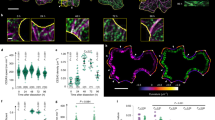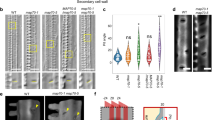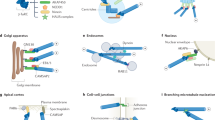Abstract
THE shape of Plant cells depends largely on the orientation of cellulose microfibrils in their cell walls1. In almost all cells where the microfibrils are regularly arranged, cortical microtubules lie parallel to the wall microfibrils. Experimental evidence indicates that these microtubules influence the arrangement of the deposition of wall microfibrils2. How microtubules determine the orientation of microfibrillar deposition is not yet known3,4, but it has been speculated that they may influence the alignment of cellulose synthetase enzymes on the Plasma membrane5. Microtubules act as a cytoskeleton in the formation and maintenance of cell shape in many types of cells6 including Plant cells which lack a cell wall7, or before a wall is deposited8, and it may be that microtubules, in those Plant cells where they are arranged congruently with recently deposited wall microfibrils, directly determine cell shape. However, using coumarin to inhibit cell wall regeneration by protoplasts of Mougeotia I demonstrate here the inability of microtubules to directly determine cell shape.
This is a preview of subscription content, access via your institution
Access options
Subscribe to this journal
Receive 51 print issues and online access
$199.00 per year
only $3.90 per issue
Buy this article
- Purchase on Springer Link
- Instant access to full article PDF
Prices may be subject to local taxes which are calculated during checkout
Similar content being viewed by others
References
Green, P. B., Erickson, R. D. & Richmond, P. A. Ann. N. Y. Acad. Sci. 175, 712–731 (1970).
Hepler, P. K. & Palevitz, B. A. A. Rev. Pl. Physiol. 25, 309–362 (1974).
O'Brien, T. P. Bot. Rev. 38, 87–118 (1972).
Robinson, D. G. Cytobiologie 15, 475–484 (1977).
Heath, I. B. J. theor. Biol. 48, 445–449 (1974).
Roberts, K. Prog. Biophys. molec. Biol. 28, 373–420 (1974).
Bouck, G. B. & Brown, D. L. J. Cell Biol. 56, 340–359 (1973).
Marchant, H. J. & Pickett-Heaps, J. D. Planta 116, 291–300 (1974).
Marchant, H. J. & Fowke, L. C. Can. J. Bot. 55, 3080–3086 (1977).
Marchant, H. J. Expl Cell Res. 115, 25–30 (1978).
Hara, M., Umetsu, N., Miyamota, C., Tamari, K., Pl. Cell Physiol. 14, 11–28 (1973).
Burgess, J. & Linstead, P. J. Planta 133, 267–273 (1977).
Itoh, T. Pl. Cell Physiol. 17, 385–398 (1976).
Hughes, J. & McCully, M. E. Stain Technol. 50, 319–329 (1975).
Marchant, H. J. Protoplasma (in the press).
Schnepf, E. Port. Acta biol. A 14, 451–462 (1974).
Author information
Authors and Affiliations
Rights and permissions
About this article
Cite this article
MARCHANT, H. Microtubules, cell wall deposition and the determination of plant cell shape. Nature 278, 167–168 (1979). https://doi.org/10.1038/278167a0
Received:
Accepted:
Published:
Issue Date:
DOI: https://doi.org/10.1038/278167a0
This article is cited by
-
Capacity for microtubule reorganization and cell wall synthesis in cytoplasts of the green algaMougeotia
Protoplasma (1994)
-
Taxol maintains organized microtubule patterns in protoplasts which lead to the resynthesis of organized cell wall microfibrils
Protoplasma (1990)
-
Microtubule reorganization, cell wall synthesis and establishment of the axis of elongation in regenerating protoplasts of the algaMougeotia
Protoplasma (1986)
-
Microtubules in statocytes from roots of cress (Lepidium sativum L.)
Protoplasma (1984)
-
Microtubules, protoplasts and plant cell shape
Planta (1980)
Comments
By submitting a comment you agree to abide by our Terms and Community Guidelines. If you find something abusive or that does not comply with our terms or guidelines please flag it as inappropriate.



